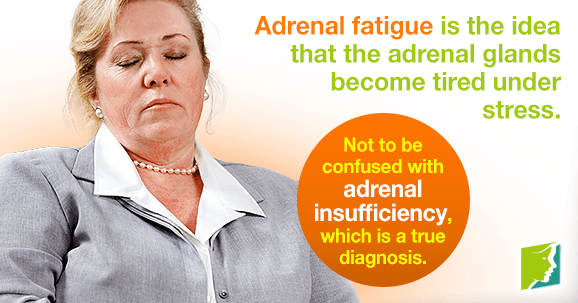Adrenal fatigue has been a debate in the medical world for many years. Because there is no test to determine or diagnosis adrenal fatigue, it is not viewed as a condition into itself. It is important to know the facts so you can recognize the differences between fatigue, so-called adrenal fatigue, and other conditions. Read more to learn about adrenal fatigue.
What Is Adrenal Fatigue?
Adrenal fatigue is characterized by non-specific symptoms, such as low energy levels, low blood pressure, and body aches. It is thought that this occurs when too much stress is placed on the adrenal glands - hormone-producers that regulate blood pressure and functions related to stress and the heart. Some branches of alternative medicine believes that people suffering from adrenal fatigue will experience exhaustion throughout the day, even though they are still able to perform normal tasks. However, changes in adrenal output have not been observed in supposed cases.
Adrenal Fatigue vs. Adrenal Insufficiency
The basis of the controversy lies with the actual medical condition known as adrenal insufficiency, also called Addison disease or underactive adrenal glands. This occurs because the adrenal glands are not able to produce enough hormones due to damage or a problem with the pituitary gland. The symptoms of Addison disease are far more serious, causing someone to become dehydrated and confused, often including nausea and vomiting. Adrenal insufficiency is determined by blood tests, and can be treated with adrenal hormone replacement medication.
How to Manage Adrenal Fatigue
Many women experience fatigue and low energy levels as part of the menopause transition or as a symptom of other conditions, such as insomnia or depression. Some lifestyle adjustments can help alleviate fatigue and restore energy levels. These include:
- Moderating alcohol intake
- Exercising regularly
- Relaxing before bed, such as with meditation
- Eating healthy
- Following a regular sleeping pattern
The main symptoms of adrenal fatigue are non-specific, general symptoms like tiredness and aches that everyone experiences from time to time. Being misdiagnosed and prescribed adrenal hormone supplements can have severe effects on your body. The medication could cause your adrenal glands to stop functioning properly on their own, leading to adrenal crisis - a life-threatening condition. Thus, any diagnosis of “adrenal fatigue”, not insufficiency, should be taken with a grain of salt.
Adrenal fatigue is just a popular name, while adrenal sufficiency is a serious medical condition. Adopting relevant changes in habit can help eliminate fatigued feelings from your life completely. However, if you are experiencing more intense symptoms, it is important to see your physician.
Sources
- Endocrine Society. (n.d.). Myth vs. Fact: Adrenal Fatigue. Retrieved November 25, 2015, from http://www.hormone.org/hormones-and-health/myth-vs-fact/adrenal-fatigue
- National Institute of Diabetes and Digestive and Kidney Diseases. (2014). Adrenal Insufficiency and Addison's Disease. Retrieved November 25, 2015, from http://www.niddk.nih.gov/health-information/health-topics/endocrine/adrenal-insufficiency-addisons-disease/Pages/fact-sheet.aspx
- University of Maryland Medical Center. (2013). Addison disease. Retrieved November 25, 2015, from https://umm.edu/health/medical/ency/articles/addisons-disease




